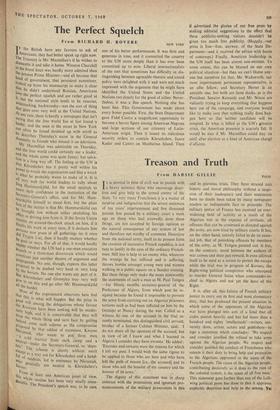The Perfect Squelch
From RICHARD H. ROVERE
NEW YORK
IF the British have any favours to ask of Americans, they had better speak up right now. The Treasury is Mr: Macmillan's if he wishes to dismantle it and take it home. Winston Churchill in his finest hour was hardly more admired than the present Prime Minister—and all because that head of government, that persistent summiteer, looked up from his manuscript to make it clear that he didn't understand Russian. Americans 1,"e the perfect squelch and are rather good at ft, but the national style tends to be raucous, Wisecracking, backwoodsy—not the sort of thing Tat goes over very well at the United Nations. At any rate, there is hardly a newspaper that isn't saying that the free world has at last found a leader, and the man in the street in New York can often be found doubled up with mirth as he describes Thursday's scene in the 'General Assembly to friends who missed it on television. Mt Macmillan was admirable on Thursday, and the free world could certainly use a leader, and the whole scene was quite funny; but salva- tion is a long way off. The feeling at the UN is that Khrushchev has it pretty well within his Power to wreck the organisation and that a wreck is what he probably wants to make of it. It is all very well for world leaders to rally about Dag Hammarskjold, for the small neutrals to assert their confidence in the institution of the Secretary-General's office, and for Mr. Ham- marskjold himself to stand firm, but the plain fact of the matter is that Mr. Hammarskjold can be brought low without either abolishing his 'ince or driving him from it. If the Soviet Union mounts an around-the-clock attack on him, if it blocks his work at every turn, if it declares him Pe.2°/la non grata at all gatherings (as it once did TrYgve Lie), then it hardly matters whether he goes or stays. For all of that, it would hardly matter whether the UN had a one-man executive branch or a three-man directorate which would constitute just another theatre of argument and propaganda. No one, though, expects this latter p,roposal to be pushed very haul or very long 0Y,the Soviets. No one else wants any part of it. But Khrushchev and Gromyko may very _well give in on this and go after Mr. Hammarskjold all the harder. Most of the experienced observers here feel that this is what will happen. But the price in good will among the delegations whose favour the Russians have been seeking will be moder- ately high, and it is conceivable that they will drop the whole thing and save face by getting _nrchind some such scheme as the compromise Pr posed by that oddest of statesmen, Kwame neutral. rurnah, who wants to put three men a cold warrior from each camp and a eeetnder the Secretary-General, as 'depu- xs. The scheme is utterly without merit cePt as a way out for Khrushchev and a hand- °hoof neutrals, led in eminence by Nkrumah, r generally are neutral in Khrushchev's Layour, From t,,, at least one American point of view, s _„`" whole session has been very nearly unen- durable The President's speech was, to be sure, one of his better performances. It was firm and generous in tone, and it committed the country to the UN more deeply than it has ever been committed up to now. Liberal internationalists of the sort that sometimes has difficulty in dis- tinguishing between agreeable rhetoric and sound policy were delighted with it and were not much impressed with the argument that he might have identified the United States and the United Nations too closely for the good of either. Never- theless, it was a fine speech. Nothing else has been fine. This Government has made about every boner possible. First, the State Department gave Fidel Castro a magnificent opportunity to become a heroic figure among American Negroes and large sections of our citizenry of Latin- American origin. Then it issued its ridiculous security orders to contain Khrushchev, Janos Kadar and Castro on Manhattan Island. Then it advertised the glories of our free press by making editorial suggestions to the effect that these publicity-seeking visitors shouldn't be given too much free publicity. (Happily, .our press is free—free, anyway, of the State De- partment—and it received the advice with hoots of contempt.) Finally, American leadership in the UN itself has been almost non-existent. To some extent, this can be blamed on our own political situation—but then we can't blame any- one but ourselves for that. Mr. Wadsworth, our most impermanent permanent representative, is an able fellow, and Secretary Herter is an amiable one, but both are lame ducks, as is the President. Senator Kennedy and Mr. Nixon are valiantly trying to keep everything that happens here out of the campaign, and everyone would like to make sure that nothing really does hap- pen here so that neither candidate will be tempted. In what is billed as the UN's greatest crisis, the American presence is scarcely felt. It would be nice if Mr. Macmillan could stay on until after election as a kind of American chargd d'affa i res.










































 Previous page
Previous page